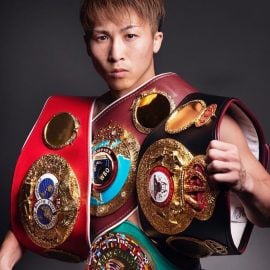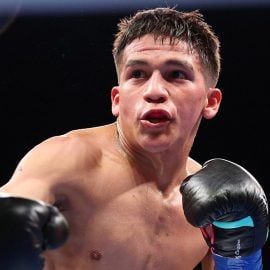Dealing With Death: The Courage And Compassion Of Charles Conwell
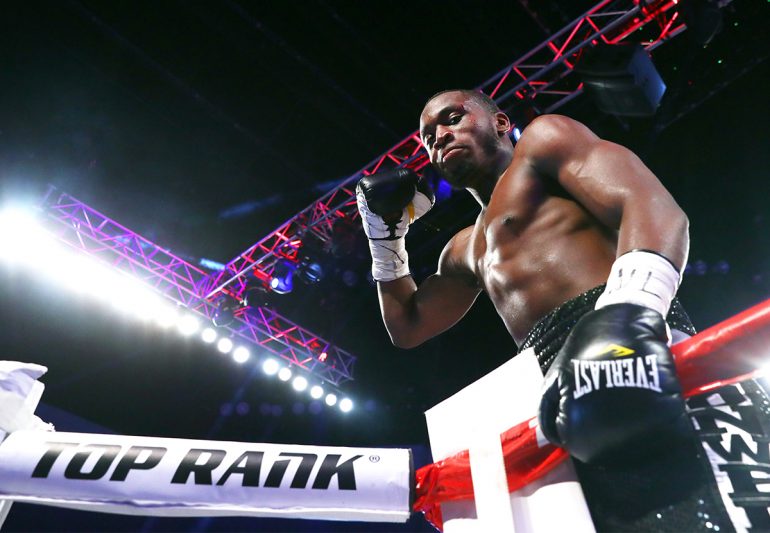
The following story originally appeared on February 7, 2020 on RingTV.com. It recently received first-place honors for “News” at the BWAA 2020 award.
The only thing moving were his eyelids. That’s what Charles Conwell was reduced to in the ensuing months after that October day. Blinking eyes lying there numb staring up at a dark ceiling with no emotional GPS to guide him. Sleep came in two-hour chunks, if that. The other moments, his eyes would flutter open, his mind preoccupied by something he couldn’t fix. Exhaustion was his only panacea.
Otherwise, guilty pangs haunted him, gnawed at him until he cursed himself back to sleep. Should he have thrown that right to the head with eight seconds left in the eighth? Should he have thrown the two rights and the left hook in the 10th?
Then, he looked down at his hands, shook his head and continued to question himself. His hands listened well that night. Too well.
Conwell slept with death. He drove death around in his car. He sat with death at dinner, and on the edge of his mother’s living room sofa, head in his hands, tears streaming down his face trying to make sense of why this happened.
Early Wednesday afternoon on October 16, 2019, Charles Conwell, the 22-year-old, 2016 U.S. Olympian and undefeated professional junior middleweight, received the best news of his life—he was going to be a father.
A few hours later, he received the worst—Patrick Day, a gutsy, full-of-life fighter from Freeport, N.Y., died four days after Conwell knocked him out at 1:46 of the 10th round of a give-and-take battle.
This Saturday night, Conwell (11-0, 8 knockouts) will enter a boxing ring for the first time since his tragic fight against Day on the Oleksandr Usyk-Chazz Witherspoon undercard, taking on Ramses Agaton (22-11-3, 12 KOs) in a low-key, eight-rounder at the Civic Center, in Hammond, Indiana.
Embossed across the front of Conwell’s trunks will be “Pat Day all day.”
***
The news didn’t come in a dead-of-night phone call. Conwell had concerns about Day’s health. He was back home, in Cleveland Heights, Ohio, getting updates. Most were bad, and getting worse. Still, Conwell hoped. He prayed. Then that Wednesday, when he got the call from his trainer, Otha Jones, the words were blunt and cutting. Each came with a piercing stab to his conscience.
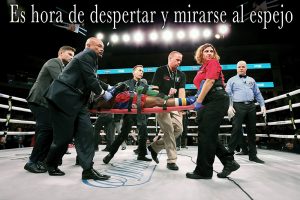
Patrick Day is taken out of the ring on a stretcher after being knocked out by Charles Conwell in the 10th round of their junior middleweight bout at Wintrust Arena on October 12, 2019 in Chicago, Illinois. (Photo by Dylan Buell/Getty Images)
“He. Did. Not. Make. It.”
Patrick Day was pronounced dead at the age of 27 at Northwestern Memorial Hospital in Chicago from brain injuries sustained in their fight.
Charles Conwell has been trying to live with that news ever since. Minutes after Jones told him, Conwell’s legs buckled. He couldn’t talk. He couldn’t breathe. He sat and cried. Shaquona Pearsall, his girlfriend, tried consoling him. Conwell received an outpouring from thousands on social media in support—and hundreds of ignorant tweets unjustifiably blaming him, some even threatening him, for Day’s death.
“How do you live with something like that?” Conwell tried rationalizing.
Conwell, according to the many who know him and are around him, is a caring, sensitive person plunged into the amoral, mixed-up world of boxing. Boxing is filled with many unconscionable jerk-offs. Charles Conwell is not one of them.
David McWater, Conwell’s manager, recounts the times Conwell will ask about each fighter in McWater’s stable and how they’re doing. It’s typical. McWater describes Conwell as the “strong, silent type, with great emotional maturity. Charles is someone who always cares about others.”
The Day death closed Conwell off. He didn’t want to speak to anyone. He didn’t answer texts or calls. He got off social media. There was no TV, no radio, because he had heard it was all over the media. He spent a lot of time with his mother, Annette Steen-Conwell, with Pearsall, Jones and his father, Charles Conwell Sr. They would insulate him, help him heal, though Charles himself knew the real mending had to come from within.
First, the visceral hurt had to subside.
“After I heard the news, I would always wake up in the middle of the night and just stare at nothing, maybe look up at the ceiling, or at a door, and think of nothing,” Charles recalled. “I stayed over my mom’s house a lot.”
He remembers going over there and falling into her comforting arms and they both wept.
Many words came at him. He rarely heard any of them. It didn’t matter where they were said, or who said them.
Time would be his shaman.
“I relived that fight in my head a thousand times,” Conwell said. “Should I have punched him here instead of there; should I have tried more body shots? I know I can’t change what happened. But I tried changing it a thousand times in my head, and then I’d wake up and I had to face this again.
“Dear Patrick Day,
I never meant for this to happen to you. All I ever wanted to do was win. If I could take it all back I would no one deserves for this to happen to them.”
“What helped me most were my family and friends. You really find out who genuinely cares about you when you go through something like this. My family and friends tried making me think about other things; they tried making me laugh and getting me back into my regular life. It took some time to get back into a routine.”
A month later, around mid-November, Conwell went back to the Soul City Boxing Gym. There was no foreign aura when he walked in. It was home. It’s always been his sanctuary, the place where he could bar the outside world from entering and hone the craft he’s enjoyed since he first put on a pair of boxing gloves. Sweating felt good. Hitting the heavy bag and the speedbag felt better.
The gym was the one place where he knows who he is—around people he could trust.
“I had to be around a positive environment, because I was killing myself going over the (Day fight) and what I could have done differently,” Conwell said. “There’s that feeling of blame. In my heart, I know I didn’t kill (Patrick Day). I had strangers text me and reach out on social media urging me to keep my head up.
“I also remember the ass—–, too. There were a lot of things they put out there on social media like I should be in jail, calling me a murderer, threatening to kill me. One said, ‘If Patrick doesn’t make it, I’m going to find you!’ That made me angry. These were people who didn’t know me that were judging me. These weren’t boxing people. Boxing people, a lot of people I know of but don’t know, all had my back. That was good to see.”
The day before Patrick Day died, Conwell tweeted the following:
“Dear Patrick Day,
I never meant for this to happen to you. All I ever wanted to do was win. If I could take it all back I would no one deserves for this to happen to them.
I replay the fight over and over in my head thinking what if this never happened and why did it happen to you. I can’t stop thinking about it myself I prayed for you so many times and shedded so many tears because I couldn’t even imagine how my family and friends would feel. I see you everywhere I go and all I hear is wonderful things about you.
I thought about quitting boxing but I know that’s not what you would want I know that you were a fighter at heart so I decided not to but to fight and win a world title because that’s what you wanted and that’s what I want so I’ll use you as motivation every day and make sure I always leave it all in the ring every time. #ChampPatrickDay
With Compassion, Charles Conwell.”
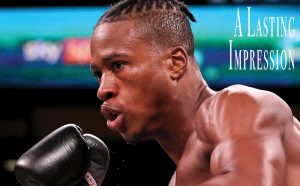
Patrick Day looks on during the first round of the fateful fight against Charles Conwell at the Wintrust Arena on October 12, 2019 in Chicago, Illinois. (Photo by Dylan Buell/Getty Images)
There were two victims that suffered the night of Saturday, October 12, 2019, in the Wintrust Arena, in Chicago, Illinois: Patrick Day, and Charles Conwell.
One tragically died, the other is trying to live with it.
***
Lou DiBella has endured his share of tragedy. The Hall of Fame promoter’s brother committed suicide. He lost four best friends, all before the age of 33, to shocking circumstances. And DiBella has viewed more than his share of tragic fights.
DiBella promoted Leavander Johnson, the former IBF lightweight titlist who faced Jesus Chavez in his first defense on September 17, 2005. Five days later, Johnson was pronounced dead from brain injuries sustained in the fight. DiBella was not as close to Johnson as he was Patrick Day.
It’s why DiBella speaks openly about his admiration of Conwell’s courage and compassion during this tumultuous time. He places Conwell right up there on the talent pantheon with other 2016 Olympians like Shakur Stevenson and Teofimo Lopez.
DiBella was in a tough spot the night of the Conwell-Day fight. He happened to be the promoter for both fighters. DiBella had an ill feeling, by the way Day looked after the fight. It was beyond serious. Day’s first CAT scan was not encouraging. DiBella knew within an hour after the fight that Day’s chances of surviving were slim.
He was among a vigilant chorus that was constantly updating Conwell about Day’s condition. He was also among those who implored Conwell not to shoulder the blame.
Conwell wanted to get back into the ring as fast as possible, because he thought it would be therapeutic. DiBella wanted Conwell to slow down and hold off.
Knowing the psychological trauma Conwell had endured, DiBella went out of his way to make sure Conwell’s comeback fight was in an obscure place. He even dipped into his own pocket to make it happen.
“I always liked Charles, but the way I’ve seen him handle this since October, I just can’t say enough good things about the kid,” DiBella said. “You see his heart and his caring about people, and it’s so adult and so evolved. The kid was hurting. It hurt me to see him hurt. I wanted Charles to reflect and talk to as many people he trusts and cares about.
“He had to get himself right before he got back into the ring again. I wanted him to start small. I don’t want any pressure on him. He’s had enough being in the spotlight about this. I want to ease him into this first fight back. It’s low-key for a reason. Charles is a very talented fighter, who will have many big fights ahead.”
“Charles already knows he’s not responsible for Pat’s death, though his hands did the damage that caused it. I don’t think Charles will ever forget that night, and I don’t think Charles will ever forget Pat Day.”
Conwell wanted to attend Day’s funeral services, though opted not to because he felt his presence there would be a distraction to Day’s moment. Plus, based on the amount of hate he was receiving from demented social media trolls, there was a fear one of them may have tried to do something harmful.
There was a rumor that Conwell contemplated retiring.
“I wouldn’t say that’s true,” DiBella said. “Charles couldn’t sleep for days and I think that thought crossed his mind for a moment. After the thought passed, thinking about Pat made him more committed to coming back. He felt he had to come back for Pat, and that’s what Pat would have expected him to do.”
Patrick Day’s family was asked to comment for this story, but decided not to. Understandably, they’ve distanced themselves from boxing.
The only thing that could heal Conwell is time and getting back to an active routine.
“Time will allow Charles to grow in the understanding that Pat was doing what he loved,” DiBella said. “Charles already knows he’s not responsible for Pat’s death, though his hands did the damage that caused it. I don’t think Charles will ever forget that night, and I don’t think Charles will ever forget Pat Day.
“With the birth of his daughter, Charles will see the circle of life and he’ll come to a greater peace through this. There have been deaths in the ring where someone was at fault. Leading up to a fight, you can have failure on the part of some person not doing their job, or some system, or testing, or whatever, when things were not done in the right way, there is culpability somewhere.
“With Pat’s situation, I don’t think there was culpability on the part of anybody. That night was a concurrence of terrible sequences in the final round that took a healthy, young athlete that gave him a life-ending injury. Sometimes, only God knows why.
“I believe Charles will be right again in the ring.”

The hope is that Conwell will be right again in the ring after the Patrick Day tragedy. (Photo by Ed Mulholland/Matchroom Boxing USA)
It happens, however, with fighters.
Ray “Boom Boom” Mancini was never the same after beating South Korean Duk Koo Kim, who died shortly after their fight in November 1981. The great Sugar Ray Robinson found it “very trying” to overcome the death of Jimmy Doyle, who died shortly after Robinson stopped him in the eighth round of Robinson’s first welterweight title defense in June 1947.
Annette Steen-Conwell has a genuine concern for her son. She absorbed his tears. She was the rock he leaned on during the most traumatic times. She hovered over him like a mother does, going so far as to tell him to come to work with her. She didn’t want him left alone.
“So, I’ll fight in his memory. That’s never going to change. I can’t let him down. I fight for two now.”
“Charles wrote the letter to Pat, because he really wanted Patrick’s parents to understand that he didn’t mean or want that to happen,” Annette said. “That helped him sleep a little bit. It took him months to get a full night sleep. It still bothers me to think about it, when I remember him questioning what he did in the ring that night.
“I hope he’s okay, because I’m his mother and I’m real nervous about this fight. Will he hold back? Will he push forward? Will he fight the way he normally does? I hope so. I’m afraid about that. Charles is going to have a baby girl, and his life has already changed. It’s going to change some more with his daughter coming.
“We spoke a lot over the phone, and I kept telling him that it’s not his fault. Our family has suffered through this, and we think about Patrick Day every day. We can’t stop and won’t stop thinking about Patrick Day. We found a lot of cruelty out there. There were death threats. There were a lot of evil things said about and to Charles, but when you consider none of these people really know the kind of person my son is, it doesn’t matter. It means nothing.
“I know my son. I know how strong he is. And we’ll always be there to support him.”
When he’s alone, Conwell will call up recent interviews of Patrick Day on his computer.
“I feel like he’s talking to me,” Conwell said. “Pat will always be with me. Winning a world championship is something he would want. So, I’ll fight in his memory. That’s never going to change. I can’t let him down. I fight for two now.”
Pat Day all day.
Forever.
Joseph Santoliquito is an award-winning sportswriter who has been working for Ring Magazine/RingTV.com since October 1997 and is the president of the Boxing Writers Association of America.
READ THE LATEST ISSUE OF THE RING FOR FREE VIA THE NEW APP NOW. SUBSCRIBE NOW TO ACCESS MORE THAN 10 YEARS OF BACK ISSUES.






